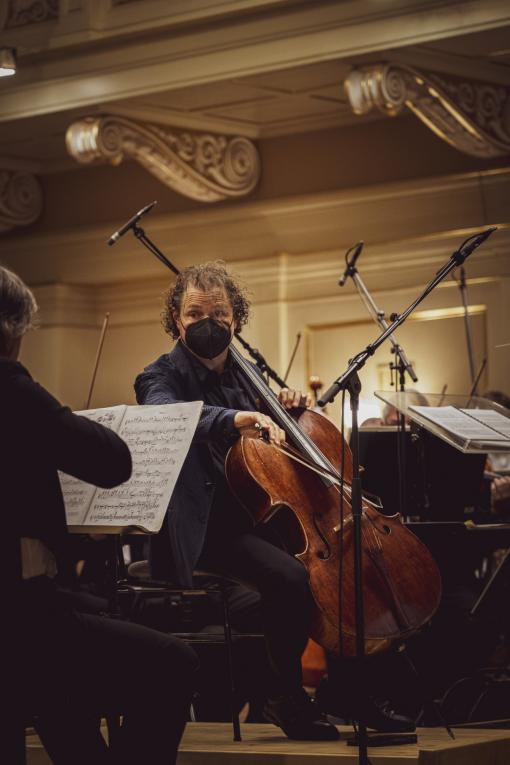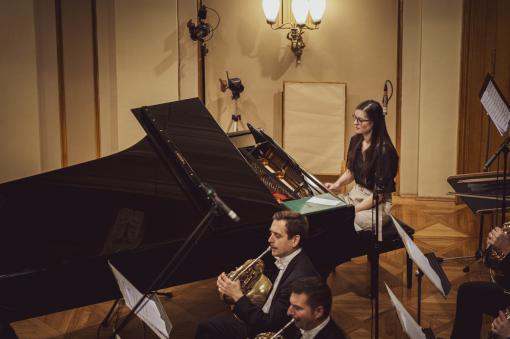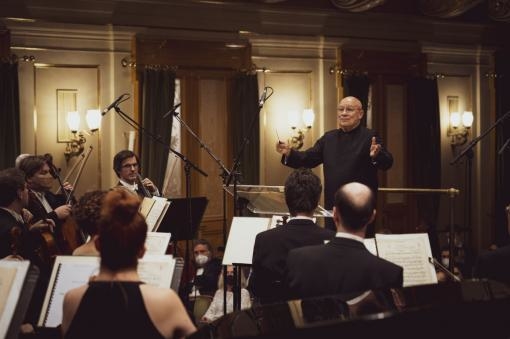The long-delayed premiere of the composition The Basement Sketches by composer Michal Nejtek, whose performance was planned for June 2020 and which was commissioned by the Brno Philharmonic, was finally performed on Thursday 25 November at the Community Hall (Besední dům) venue. Together with the Cellar Sketches, the Variations on a Theme by Haydn in B flat major, Op. 56a by Johannes Brahms and Cello Concerto Op. 22 by Samuel Barber were played. In addition to Brno Philharmonic players, cellist Matt Haimovitz and pianist Nikol Bóková also performed. The dramaturgically varied evening, consisting of three distinctly different musical pieces of work and period contexts, was led by the ensemble’s chief conductor Dennis Russell Davies.
The concert was opened with Brahms’ Variations on a Theme by Haydn – a ten-movement work (including the opening Theme and Finale) inspired by the motif of the “Chorale St. Antoni” from the second movement of a wind serenade previously attributed to Joseph Haydn. However, later research has disproved this authorship and to this day the original composer is unknown. Possible candidates include, for example, Haydn’s student Ignaz Joseph Pleyel, although even his authorship has not yet been confirmed. It is not even clear whether the mentioned “Chorale St. Antoni” comes directly from the composer of the wind serenade, or whether it is also a quoted motif from an unknown composition. What is certain is that to date no other “Chorale St. Antoni” has appeared.

The theme itself is heard at the beginning of Brahms’ composition almost in its original form. In the following eight movements, however, it undergoes variation, instrumentation and harmonic changes that fundamentally alter the character and mood of the subject. The place of the concertmaster yesterday went to violinist Leoš Zavadilík, although the original line-up counted on Marie Petříková. Zavadilík, however, managed the duties of concertmaster without the slightest difficulty, although it is likely that the change was sudden and unexpected. The orchestra, under the direction of Dennis Russell Davies, was rhythmically and intonationally precise and sonically balanced. In terms of dynamics and work with tempo, however, the result was short of breath – the chief conductor of the Brno Philharmonic is, generally speaking, inclined to a more circumspect interpretation of musical works. So the tempo differences between the movements in the Brahms piece were smaller than I think would have been appropriate. In short, the Poco presto or Vivace movements should always be significantly faster than the Andante. In Davies’s performance, however, most of the fast movements were rather bordering on the Allegretto. The same was true of the dynamics, where major differences appeared perhaps exclusively in the sixth, seventh, eighth variations and the final Andante. Until then, the music oscillated somewhere between mezzo-piano and mezzo-forte. The combination of dynamics and tempo unfortunately took away the gentle and “wilder” musical element from Brahms’ piece.
The following Cello Concerto by Samuel Barber, however, helped to stir this “state of static”. Davies led the orchestra much more predatorily and with greater variation between dynamics – creating a good breeding ground for the cello in the hands of Matt Haimovitz. The soloist skilfully balanced between a gentle, sometimes unusually sweet tone and a harsher expression in the more dramatic areas. However, it was clear that the quieter parts formed the focus of his work with tone colour. From the point of view of phrasing, the second movement Andante sostenuto can undoubtedly be singled out, which gave Haimovitz the greatest scope for building arching sections with a successful concluding punchline.
The second half of the programme belonged to the announced premiere of Michal Nejtek’s work. Before the orchestra could begin the first movement of The Secret Garden from the five-movement symphony The Basement Sketches, Vítězslav Mikeš, the artistic administrator of the Brno Philharmonic, introduced the audience to the most important compositional elements of the upcoming work. Moments later, the soft surface of the string section rang out, punctuated only by occasional glissandos. Practically from the very beginning, it was obvious that Nejtek’s symphony would be built primarily on colourful orchestral colours and that the melodiousness as such would complete the complex pattern rather than stand out too much. The second and much more dramatic movement, The Owls Are Not What They Seem, offered a different pattern from the spectrum of orchestral colours. The peculiar minimalism in conjunction with the gradually increasing dynamics gave a sense of gradation, which, however, led nowhere. The movement thus partly evoked a sound phenomenon known as the Shepard tone – a seemingly constantly rising tone, but which in fact remains at the same pitch all the time.

The third and distinctly improvisational part Blind Walk belonged exclusively to pianist Nikola Bóková. Although the piano plays an important role in the other movements, here it appears as a solo instrument. In Nikola Bóková’s improvisation, there were hints not only of Nejtek’s work, but also of jazz, a genre very close to the pianist's heart. Although it was practically the shortest of the movements, its placement and the completely different musical texture secured it a unique place within the entire composition. The following movements, In a Vicious Circle and Lapis Lazuli, then became a kind of reflection of the first half of Nejtek’s composition.
Although a few visitors were probably not impressed by the development of the evening, as indicated by the early departures of several individuals, despite its thematic and stylistic breadth, each piece had a well-deserved place on the programme. Moreover, the concert successfully mapped the development of musical language and proved that even modern and highly contemporary music can sound tender, mysterious, sweet, scary or apathetic. And if the listener accepts the premise that similar and (perhaps even exactly the same!) things can be said in many ways, he or she is in for a sincere and unconventional musical experience, in which something old and familiar still remains. And yet the music speaks to us in this way with freshness and a whole new vigour.
JOHANNES BRAHMS
Variations on Haydn’s Theme in B flat major, Op. 56a I 18'
Theme: Chorale St. Antoni. Andante
1st variation Andante con moto
2nd variation Vivace
3rd variation Con moto
4th variation Andante
5th variation Poco presto
6th variation Vivace
7th variation Grazioso
8th variation Poco presto
Finale: Andante
SAMUEL BARBER
Cello Concerto Op. 22 I 30'
- Allegro moderato
- Andante sostenuto
- Molto allegro e appassionato
MICHAL NEJTEK
The Basement Sketches, symphony for orchestra and piano, commissioned by the Brno Philharmonic, world premiere I 35'
- The Secret Garden
- The Owls Are Not What They Seem
- Blind Walk
- In a Vicious Circle
- Lapis Lazuli
Community Hall (Besední dům), 25 November 2021, 7 p.m.

































No comment added yet..